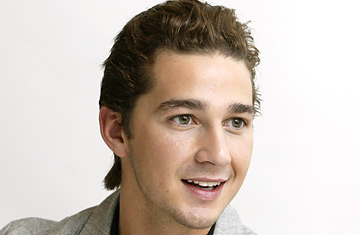
Shia LaBeouf
(2 of 2)
For the next few years, LaBeouf bounced from big studio projects like I, Robot and Constantine to indie résumé builders like Bobby and A Guide to Recognizing Your Saints. His parents divorced; he made room for his dad at his place. And he began to draw on his complicated relationship with his parents in his work. In the coming-of-age drama Guide, LaBeouf's character struggles to connect with his emotionally distant father, played by Chazz Palminteri. Before filming a confrontation scene between the characters, LaBeouf called his dad from the Queens, N.Y., set and asked him to sing a James Taylor song. "Oh, Mexico, never really been, but I'd sure like to go," LaBeouf sings. "Every time he sings it, I just go nuts. That was one of the songs he would sing all the time when he called me from the VA hospital, not remembering he had sung it before. He'd be like, 'Shia, I got a new song.' That was the worst time in my life as far as our family goes." LaBeouf drew on the memory again for scenes in Disturbia, in which he plays an aggrieved high schooler who attacks a teacher and ends up under house arrest. For all his Hanksian Everyguy appeal, LaBeouf's performances in these two films reveal flickers of Sean Penn--style pent-up fury. "A lot of actors in their 20s don't have that much range," says LaBeouf's Transformers co-star John Turturro. "The world is different now, less rugged in some ways. Everything is facile. But Shia has something else. He's been through a lot." Stardom in youth doesn't guarantee career longevity, though, says Turturro. In Transformers, LaBeouf plays a kid four years younger than his actual age. "Shia's playing juveniles right now," says Turturro. "He's just gotta make sure he develops, so when this period of time passes, he can do other things."
LaBeouf is aware of the paths he could take, professionally and personally. Yale School of Drama expressed interest in him, but he's stalling so he can do Indiana Jones 4. He describes his ideal career legacy as "Gary Oldman meets Hilary Duff," in that he wants to make quality films that people actually see. LaBeouf doesn't party--his father's drug problems were "my personal DARE program," he says. That doesn't mean he thinks his life is healthy. "This-- the stress, anxiety, fear--probably kills me just as fast as doing drugs. I don't know how you can get a grip on this." LaBeouf says it's hard to find people who share his challenges. "It's not like you can go to a therapist, 'Hey, remember the time you showed up and Harrison was doing the whip?' It's that weird feeling that, Oh, man, now you've gotta bring your A-game and there's no playbook. The emotional cost is high. Your life becomes secondary to your work." He doesn't date much. For fun he goes to see the Dodgers or plays video games with his friends. He describes himself as close to both parents today: his father, who is now sober, lives in a teepee in Montana; his mother, not far from him in Tujunga, Calif. "They're old hippies," he says. "They're not really worker bees. They're artists who just didn't have enough bureaucrat in them to get it all wrapped up in a nice little package to be able to feed to the American public."
The affable LaBeouf, it appears, has plenty of bureaucrat in him. "This is just a bigger hot dog that I'm selling," he says, of acting. "It's the same type of thing. You get dressed up. You do your clown. And if somebody buys a hot dog, then I get Steven Spielberg goin', 'O.K., kid' instead of my pop now." LaBeouf has a tattoo on his right wrist that reads 1986-2004. "My childhood," he explains. "I've been working since I was 10; 2004 is when I decided I became an adult. It was a personal decision." When it's pointed out to LaBeouf that the AA meetings and agent hounding of his youth might suggest he attained adulthood earlier, he shrugs. "But I'm living in a child's world now," LaBeouf says. "A dream world. I go to sleep at night, and I feel like I just dreamed the whole day."
